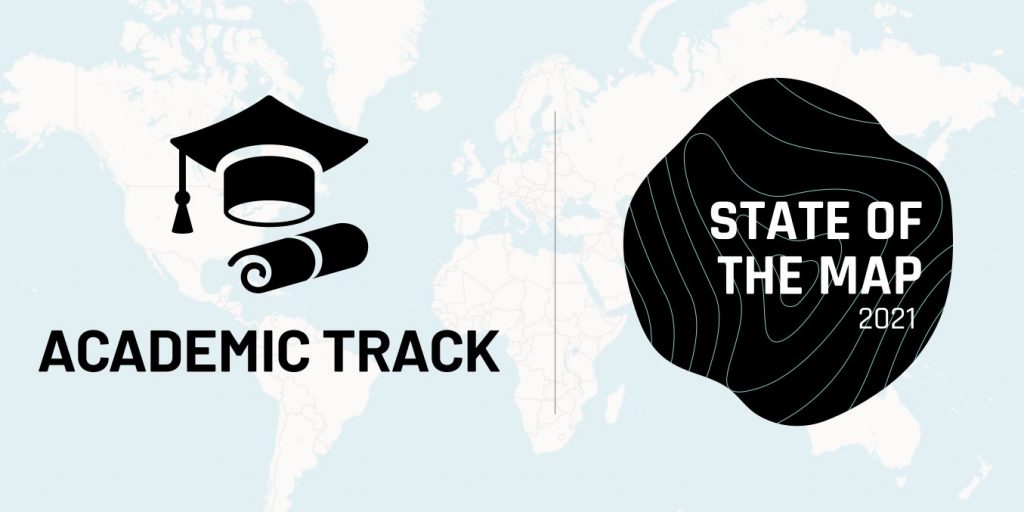
The call for abstracts for the Academic Track for State of the Map 2021 is now open!
This year’s State of the Map conference will feature the fourth edition of the Academic Track – a full day of sessions dedicated to academic research about, and with, OpenStreetMap (OSM).
The Academic Track sessions provide a bridge to connect members of the OpenStreetMap community and the academic community through an open passage to exchange ideas, communication and opportunities for increased collaboration. We expect empirical, methodological, conceptual, or literature-review-based contributions addressing any scientific aspect related to OSM, in particular, but not limited to, the following:
- Extrinsic or intrinsic quality assessment of OpenStreetMap data
- Analysis of contribution patterns in OpenStreetMap
- Generation of new and scientifically valuable datasets from OpenStreetMap
- Assessments of data import procedures and their impacts on data and community
- Integration between OpenStreetMap and other data sources (authoritative, user-generated, or otherwise valuable to OSM)
- Analysis/comparison of available software for scientific purposes related to OpenStreetMap
- New approaches to facilitate or improve data collection and/or data quality in OpenStreetMap (e.g. through gamification or citizen science approaches)
- Artificial Intelligence / Machine Learning and OpenStreetMap (e.g. AI-assisted mapping)
- Open research problems in OpenStreetMap and challenges for the scientific community
- Cultural, political, and organizational aspects of data production and usage practices in OpenStreetMap
- Studies using OpenStreetMap data in scientific domains
- Reviews of any scientific aspect connected to OpenStreetMap
Guidelines for submission:
- Abstracts should be between 800 and 1200 words and are to be submitted online in plain-text format (no images or figures).
- Abstracts must be scientifically rigorous and the content should be logically structured as follows (without the need to include subsections): introduction/background, where the problem addressed is introduced; main aim or purpose of the study; brief description of the methodology and findings achieved; final discussion highlighting the scientific contribution of the study and its practical benefits/implications.
- Submission should be done using the dedicated Pretalx submission system (https://pretalx.com/sotm2021-academic/cfp)
Submission deadline
25 April 2021, 23:59 (UTC)
Abstracts will be evaluated by the scientific committee. Authors of selected abstracts will be invited to deliver an oral presentation during the Academic Track sessions at the online conference or to present a poster (in case a virtual poster session will be organised).
Submit your proposal today! https://pretalx.com/sotm2021-academic/cfp
Learn more about the requirements and the scientific committee (https://2021.stateofthemap.org/calls/academic/#committee) on the official State of the Map 2021 website: https://2021.stateofthemap.org/calls/academic/
State of the Map Working Group
Do you want to translate this and other blog posts in your language…? Please email communication@osmfoundation.org with subject: Helping with translations in [your language]
The State of the Map conference is the annual, international conference of OpenStreetMap, organised by the OpenStreetMap Foundation. The OpenStreetMap Foundation is a not-for-profit organisation, formed in the UK to support the OpenStreetMap Project. It is dedicated to encouraging the growth, development and distribution of free geospatial data for anyone to use and share. The OpenStreetMap Foundation owns and maintains the infrastructure of the OpenStreetMap project, and you can support it by becoming a member. The State of the Map Organising Committee is one of our volunteer Working Groups.
OpenStreetMap was founded in 2004 and is an international project to create a free map of the world. To do so, we, thousands of volunteers, collect data about roads, railways, rivers, forests, buildings and a lot more worldwide. Our map data can be downloaded for free by everyone and used for any purpose – including commercial usage. It is possible to produce your own maps which highlight certain features, to calculate routes etc. OpenStreetMap is increasingly used when one needs maps which can be very quickly, or easily, updated.
